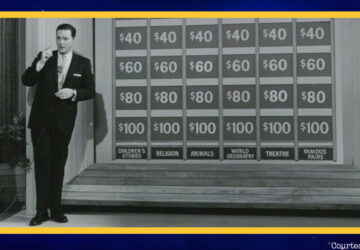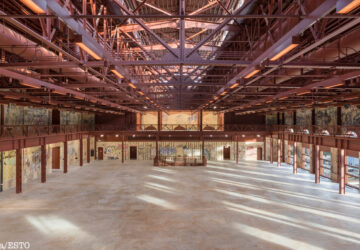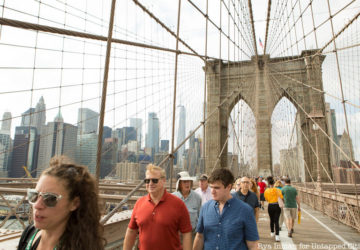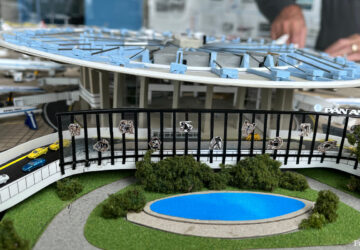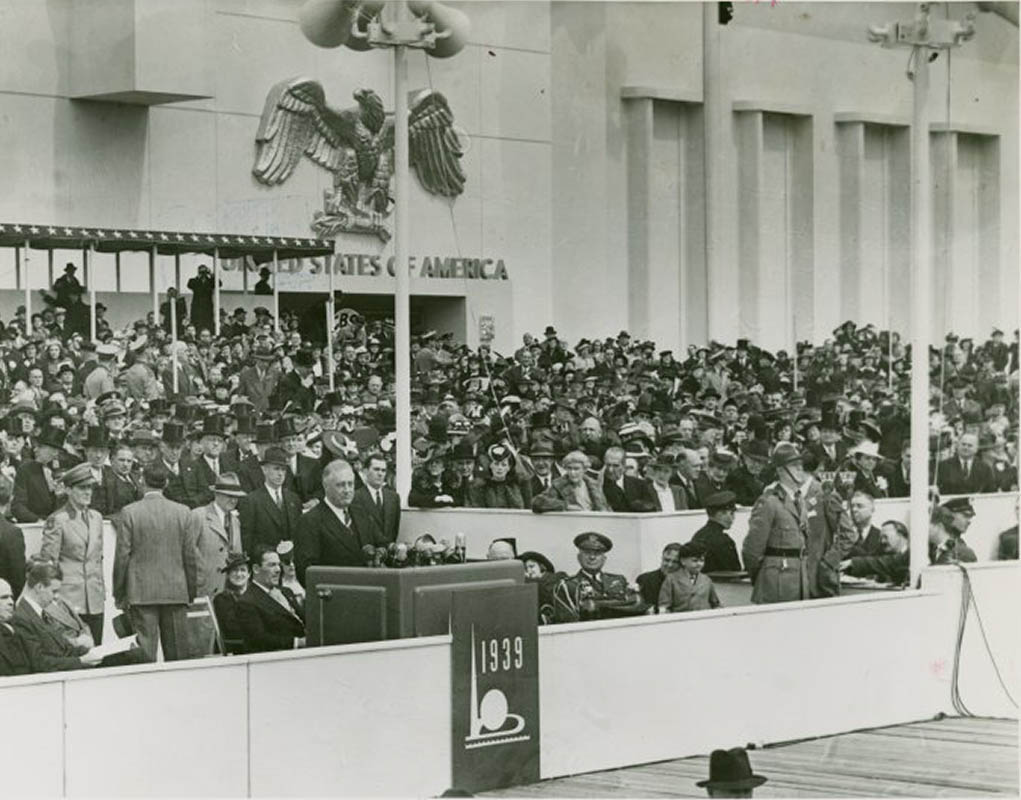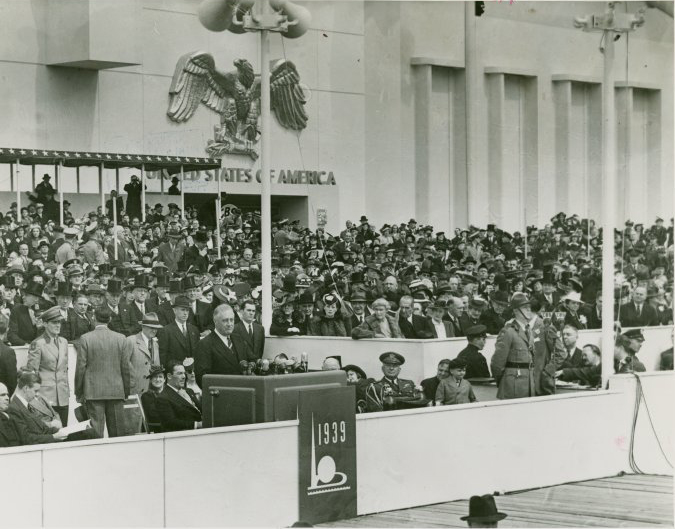 FDR at the opening day speech of the World’s Fair on this date in 1939. Photo from NYPL Digital Collections.
FDR at the opening day speech of the World’s Fair on this date in 1939. Photo from NYPL Digital Collections.
On April 30, 1939, 83 years ago today, the 1939 New York World’s Fair began at Queens’ Flushing Meadows-Corona Park. The second most expensive American World’s Fair, this year’s featured the slogan “Dawn of a New Day” in celebration of “the world of tomorrow.” It featured 62 participating nations. Six months into the World’s Fair, World War II broke out and affected many exhibits, but the Fair continued to showcase innovations in literature, film, and television.
Included at the Fair was the Westinghouse Time Capsule, set to be opened in 6939, containing writings of Albert Einstein and Thomas Mann, Camel cigarettes, millions of pages of microfilm, and copies of Life Magazine. Composers such as Ralph Vaughan Williams wrote works for the Fair, and in honor of the Fair’s future theme, the Fair also held the 1st World Science Fiction Convention. Albert Einstein also spoke about cosmic rays at the grand opening.
Yet perhaps the most famous figure at the grand opening was President Franklin Delano Roosevelt, who spoke to a crowd of 206,000 people. The opening ceremony coincided with the 150th anniversary of George Washington’s presidential inauguration, which had taken place at Federal Hall on Wall Street. Despite the Fair’s large attendance on April 30, many of the pavilions were not yet finished with construction.
“I have seen only a small fraction of the Fair; but even from the little I have seen, I am able to congratulate all of you who conceived and planned the Fair and all you men and women who built it,” Roosevelt’s speech began. Roosevelt had also attended the cornerstone laying of the Federal Building (a temporary building that no longer exists) on June 30, 1938. In Roosevelt’s speech that day, he noted that a Master Mason had certified “that the cornerstone is well and truly laid and, in turn, I have assured him that I hold a union card.”
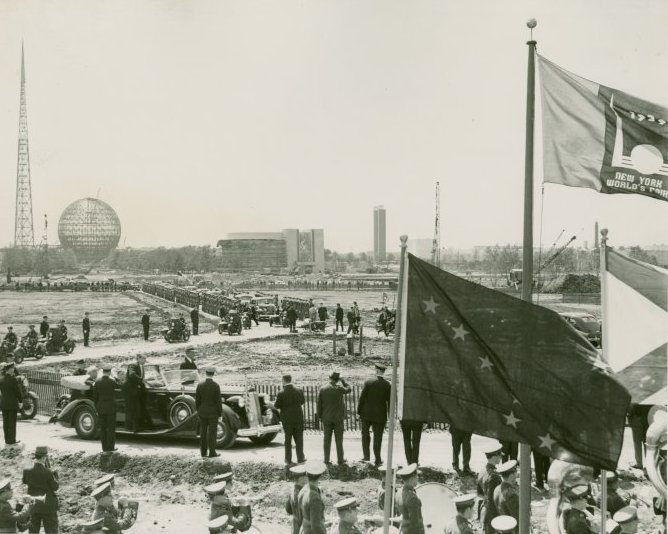 FDR attending the cornerstone laying for the Federal Building at the World’s Fair in 1938. Photo from NYPL Digital Collections.
FDR attending the cornerstone laying for the Federal Building at the World’s Fair in 1938. Photo from NYPL Digital Collections.
Roosevelt started his speech by describing the birth of democracy in the modern United States, as the Constitutional Convention was formed two years before Washington’s inauguration. Roosevelt praised the Constitution’s unchanging nature and the country’s 130 million people, who have embraced the founding documents of the country. With the passage of crucial amendments ending slavery and granting women’s suffrage, Roosevelt noted that personal liberties and natural rights have been mostly protected throughout the nation’s history.
“Once only has the permanence of the Constitution been threatened,” he noted. “It was threatened by an internal war brought about principally by the very fact of the expansion of American civilization across the Continent—a threat which resulted eventually and happily in a closer union than ever before.”
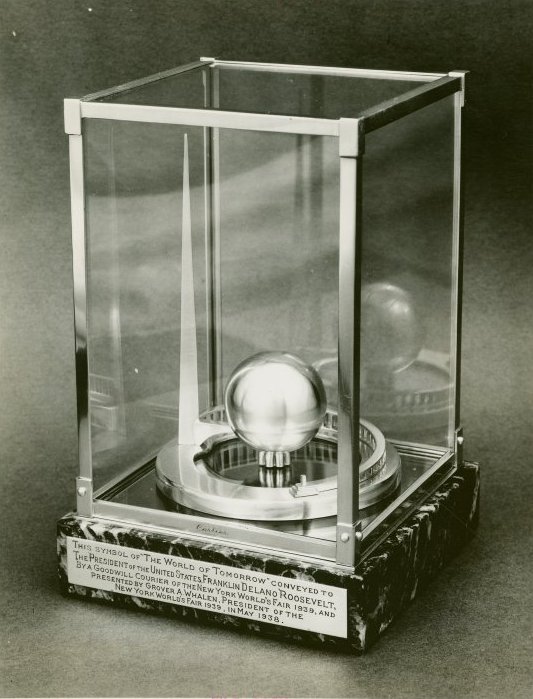 Replica of the Trylon and Perisphere given to FDR. Photo from NYPL Digital Collections.
Replica of the Trylon and Perisphere given to FDR. Photo from NYPL Digital Collections.
Roosevelt then stated how the United States stands as a homogeneous nation united in its desire for progress and development, bringing together people from all nations. Stressing the desire for world unity, Roosevelt thanked world leaders who helped make the World’s Fair possible while noting the Fair’s mission to reach for the stars.
“All who come to this World’s Fair in New York and to the Exposition in San Francisco will, I need not tell them, receive the heartiest of welcomes,” he said. “They will find that the eyes of the United States are fixed on the future. Yes, our wagon is still hitched to a star. But it is a star of friendship, a star of progress for mankind, a star of greater happiness and less hardship, a star of international good will, and, above all, a star of peace.”
 1939 World’s Fair. Photo from New York Public Library’s World’s Fair 1939 and 1940 Incorporated Records Archive.1939 World’s Fair.
1939 World’s Fair. Photo from New York Public Library’s World’s Fair 1939 and 1940 Incorporated Records Archive.1939 World’s Fair.
Roosevelt’s speech was one of the first by a President of the United States to be televised, even though a small percentage of New Yorkers had televisions in 1939. Many people were skeptical of the television’s creation, so the World’s Fair featured one made with a transparent case to make its inner components visible. His speech was also broadcast on several radio stations.
In the video of the speech, a young man just behind Roosevelt who gets up and sits down multiple times, thinking the speech is about to be over. In the end, you see him rapidly get the cane to Roosevelt.
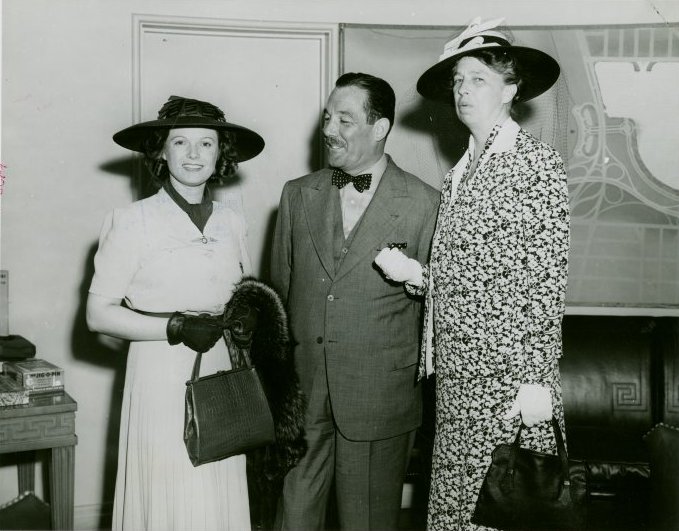 Eleanor Roosevelt with Anna Neagle and Grover Whalen, President of the World’s Fair. Photo from NYPL Digital Collections.
Eleanor Roosevelt with Anna Neagle and Grover Whalen, President of the World’s Fair. Photo from NYPL Digital Collections.
Eleanor Roosevelt would also attend the World’s Fair on other occasions — giving a speech and just visiting as an attendee. From her writings, seems to have thoroughly enjoyed it. On May 4, 1939 she describes a group outing as a “delightful evening”.
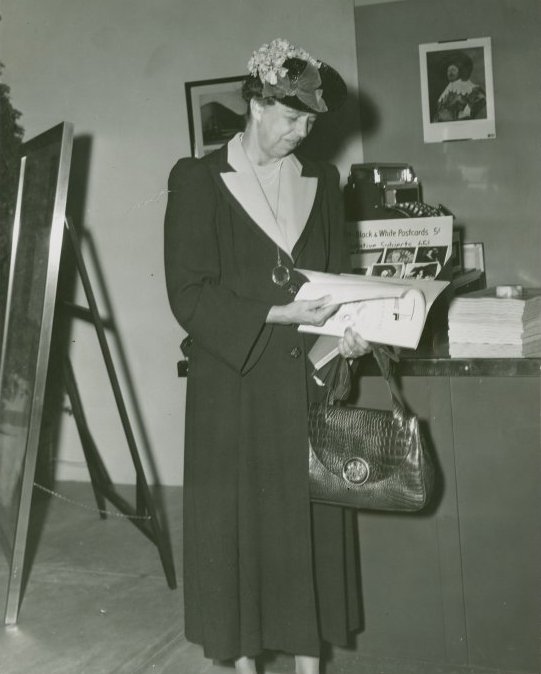 Eleanor Roosevelt with the Masterpieces of Art catalogue at the World’s Fair. Photo from NYPL Digital Collections.
Eleanor Roosevelt with the Masterpieces of Art catalogue at the World’s Fair. Photo from NYPL Digital Collections.
She also writes, “A group of us drove out last evening to the New York World’s Fair to see the lighting, and I must say that I would not have missed the 9:00 o’clock playing of the fountains, even for the very good dessert which we were obliged to forego. I have seen the fireworks and fountains in action at Versailles and am familiar with other displays of this kind but, for the first time, they have found a way here to keep the color in the water right to the top of the spray and it adds much to the general effect…There is much of interest to be seen now, however, and no one should go to this Fair with the idea that one or two visits will satisfy their curiosity.”
Although many of Flushing Meadows-Corona Park’s facilities remain closed as a result of the coronavirus, there are plenty of remnants you can see in the park, including a Roman column from 120 A.D., the original street grid, the marker for the time capsules, and more. Roosevelt’s speech still inspires 81 years later, encouraging us to look towards the future when life can return to normal again.
Next week, join us for a live virtual talk about the New York Pavilion with the people behind the restoration!
